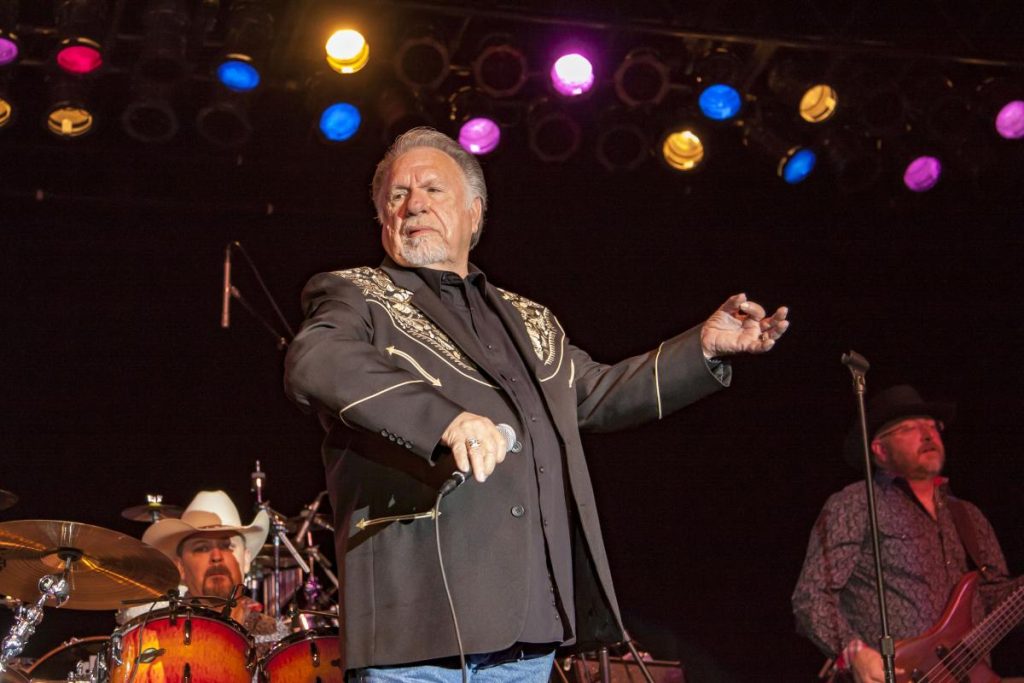“Farewell Party” by Gene Watson is a hauntingly beautiful and poignant country song that has left an indelible mark on classic country music fans. Released in 1979, this song became one of Watson’s most iconic hits, reaching #5 on the Billboard Hot Country Singles chart and cementing his reputation as one of the most soulful voices in the genre. Known for its emotional depth and timeless appeal, “Farewell Party” explores the theme of love, loss, and inevitable separation.

At its core, the song is a mournful ballad that touches on the idea of saying goodbye—both in life and, metaphorically, in love. The lyrics tell the story of a man contemplating his eventual departure from this world, envisioning how people would react when his time comes. He imagines his “farewell party,” but within this idea of physical death lies a deeper sense of emotional loss, particularly in love. The mournful tone is set immediately from the first verse:
“When the last breath of life is gone from my body, and my lips are as cold as the sea…”
With these opening lines, the song plunges into its introspective and sorrowful narrative. The protagonist is not just thinking about death, but more profoundly about the people he will leave behind, especially the woman he loves. In this context, his farewell party becomes symbolic of the pain he feels from unrequited love and the realization that she might not feel the same depth of emotion for him as he does for her.
The heart-wrenching chorus drives this emotional weight home:
“Don’t be mad at me for wanting to keep you, ’til my life on this old world is through…”
Here, the man acknowledges his selfish desire to hold on to the love he has, even though he knows it is not sustainable. His desire to “keep” her reflects the loneliness he feels, which he tries to mask with thoughts of this imagined farewell. It’s as if he is already preparing for the emotional loss he expects from the end of their relationship—or his life—because of the emotional distance between them.
The song’s arrangement perfectly complements the somber mood. With a slow tempo and rich traditional country instrumentation, including the haunting presence of steel guitar, the music amplifies the sense of melancholy. The steel guitar, in particular, adds to the sorrowful tone, as its lonesome sound seems to echo the protagonist’s deep sense of heartache. This creates a sense of inevitability and sadness, mirroring the finality of the farewell he envisions.
Watson’s smooth, rich baritone delivers the lyrics with such emotional depth that listeners can feel the pain of the protagonist as if it were their own. His ability to convey vulnerability and sorrow is unmatched, making “Farewell Party” one of his most memorable and touching performances.
Though the song deals with heavy themes like death and emotional loss, it remains deeply relatable to anyone who has experienced the end of a relationship or the inevitable passing of loved ones. It taps into the universal fear of being left alone, of saying goodbye when we’re not ready, and of holding onto love even when we know it may slip away.
Perhaps what makes “Farewell Party” so powerful is its timeless message about the fragility of life and love. While the protagonist envisions a literal farewell party, the song’s themes go beyond just the physical act of dying. It speaks to the fear of losing love, the pain of being left behind, and the loneliness that comes with such separations. There’s an underlying acknowledgment that, in life, farewells are inevitable—whether they come through death, emotional distance, or the end of a relationship.
For many fans, this song resonates not only because of its emotional depth but also because of Gene Watson’s masterful vocal delivery. His voice, with its gentle yet powerful resonance, perfectly conveys the heartbreak and introspection woven into the lyrics. He doesn’t just sing the song; he lives it, bringing the listener along with him on this sorrowful journey.
“Farewell Party” remains one of the most beloved songs in Watson’s catalog and a staple of country music’s golden era. It showcases the genre’s ability to tackle themes of love, loss, and mortality with grace and emotional honesty, offering a kind of catharsis for listeners who find solace in its lyrics. Even decades after its release, the song still holds the power to move people, proving that the best country music is timeless and speaks to the deepest parts of the human experience.
In the broader context of country music history, “Farewell Party” stands as a testament to Gene Watson’s enduring legacy as one of the great traditionalists of the genre. His voice, combined with the emotional depth of the song, creates a lasting impact that continues to resonate with fans old and new.
🎵 Let’s sing along with the lyrics! 🎤
When the last breath of life
Is gone from my body
And my lips are as cold as the sea
When my friends gather ’round
For my farewell party
Won’t you pretend you love me?
There’ll be flowers from those
Who cry when I’m gone
And leave you in this world alone
I know you’ll have fun
At my farewell party
I know you’ll be glad when I’m gone
Don’t be mad at me for wanting to keep you
‘Til my life on this old world is through
You’ll be free at the end of my farewell party
But I’ll go away loving you
There’ll be flowers from those
Who cry when I’m gone
And leave you in this ol’ world alone
I know you’ll have fun
At my farewell party
I know you’ll be glad when I’m gone
Oh, I know you’ll be glad when I’m gone